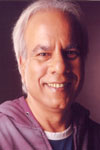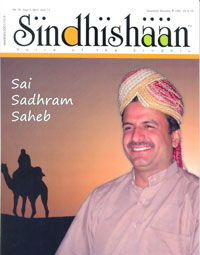Kismat Jo Khel
By Arun Babani

To explain the many strange and inexplicable happenings in life, the Gurus and philosophers down the ages have created and formulated certain maxims and formulas. The most commonly used go as these: Kismat jo khel. Karman jo Phal. Kudrat jo karishmo. Duniya jo dastur. Waqt ji pheri. These and a few others like these are often used as the explanation for life's mysterious ways. Even if one takes them as the final word, if you read closer they are not the answers to man's predicaments, rather they take the irrationality of life as a given premise. And so, when you fail to understand or analyze an event you use these formulas and take it as 'understanding' that event. Some one gets a lottery. If he happens to be deserving then it is Karman jo phal. If not then it is Kismat Jo khel!
But most of us are not impressed by these efforts to explain the inexplicable. We would rather say 'Well, I don't know” Listen to UG's words: “understanding is the absence of demand for understanding. ” These formulas don't offer understanding, only a so called explanation and that too an improvable lame one. Now we ask, why do we demand to know or understand everything that surrounds us? Simple. Because we feel utterly helpless at the mystery that is life. We cannot feel at one with what surrounds us unless we 'know” it, “understand” it. But what kind of knowing is that? Naming. Labeling. When I encounter something I cannot name, that puts me in an awkward and helpless state. The whole teaching of man is a collection of labels and names. Tree. Dog. Hat. And then we are easy, comfortable.
Actually in organized societies a tremendous effort has been on to squeeze and capsule this vast immensity and grandeur of life into tiny doses to be taken one at a time. The mind cannot even begin to encounter this infinity of colors, so we have learned to wear spectacles that make everything look black or white or grey. So instead of living a life we simply end up taking a guided tour of it. These maxims we spoke of are also labeling the unknowable, fixing a nameplate on the nameless. They are the desperate attempts of man to put life into neat little theorems that, like sand castles, wither away at one hard ripple of life. These formulas deprive life of its awe, its wonder, its mystery, and cage it and lock it with the keys of burdensome logic and knowledge that comes apart at the slightest provocation of reality. The label man has fixed for the vast infinity above us is a three lettered word, 'sky' and that is the end of the matter for him. When you name and you know your eyes are blinded of wonder and joy and innocence.
‘Sindhi Culture’ runs away with ‘Globalisation’
Elders of our great community never seem to be tired of lamenting the disappearance and loss of Sindhi culture. They keep repeating that our culture and tradition is in great danger of extinction. Where is the Sindhi culture? In villages and towns of Sindh? In Shikarpur and Nawabshah? Or in the streets of Adipur and Ulhasnagar? Where does it live, thrive and prosper? What, one may ask is the Sindhi tradition and culture?
When Malaika Arora dances to the beat of 'Munni badnaam hui…', does the great Punjabi tradition of Buleshah approve of her? When Katrina Kaif shakes her hips to, 'Sheela ki jawani.. .', does the great Islamist heart beat with her? Or does the great Christian tradition of Shakespeare and Jesus applaud Michael Jackson's wild and vulgar dance movements? Are not all these great cultures and traditions in deep-sea doldrums as far as their youth is concerned?
It is always being repeated that we Sindhis have no home town and that this is the reason we have no culture. This is highly debatable. Sindhis are primarily a moneymaking community. They were rich even in their homeland 100 years ago. Culture has never been their special subject. What we have so far been fed in the name of culture and tradition is mostly religion and rituals. Most of our cultural events center around songs, bhajans, chowkies and bhagat. There is very little in terms of modern art, modern theatre, new literature and cinema. No new experiment or evolvement has been attempted for the last 100 years or so. There is not one international Sindhi name in any segment of Art, Philosophy and Culture. At the same time you will find dozens of big Sindhi names in business and commerce. That is how it is, take it or leave it.
For a Sindhi, culture is not a worthwhile investment. He'd rather teach his children manners and morals. But culture? Arts? No way. Get married, join the family 'pedi ' and give me a grandson. That is how it is, take it or leave it.
As far as the culture and tradition is concerned, as we pointed out earlier, all the so-called great traditions and cultures of the world are sinking ships, overloaded either with cash, arms or vulgarity. No tradition, as old as man, can now hold on to its purity and privacy. These are the times of globalization and the value of culture and tradition is fast being replaced with the value of wealth and power. So being rich is the new definition of being cultured. Even if you may have to live out on bail you are still special and respectful if you are rich and yes, you are allowed to throw your party in prison! Well, almost.
Corruption and crumbling moral standards are not political subjects. These are human subjects. It is a human crisis resulting from humanity's long and stubborn refusal to question itself. And Sindhi is a human being first, part of the human herd, part of this massive human crisis. Sindhi culture of Nawabshah and Shikarpur may have vanished but so has the Roman Christian culture or Sufi Islamist tradition.
Obituary of a Living Revolutionary
A Sindhi revolutionary is dying, on his death bed, in his one room tenement, in a suburb of Mumbai. He is ninety. He took birth in 1922 in Nawabshah, Sindh, now in Pakistan our forever hostile neighbour. At 20 he had plunged into the freedom struggle, with the Mahatma and at 27 he was forcibly deported to India.
The freedom struggle ended in 1947, but for Sindhis a far more difficult and violent struggle began. The struggle for resettlement. From about 1950 to 1980 this revolutionary participated in the ensuing resettlement struggle with his community. First came the struggle for a separate state for the Sindhis. Gandhidam was gained. Then came the struggle to get Sindhi language recognized and registered with the Indian government. That took years of hard struggle, hunger strikes and demonstrations. That was achieved. Then the revolutionary started a struggle to get Sindhi language amongst others to denote denomination on the currency notes. After years of legal battles we lost. The revolutionary was not disheartened. Along with other major economic resettlement issues, he and his colleagues fought with the government for a special financial aid for the dwindling Sindhi language. NCPSL was thus formed. More struggles, more movements and by the 1980s cracks began to appear in the revolutionary's dreams. Sindhi schools shut down, Sindhi people stopped using the language, Sindhi newspapers and magazines disappeared, and Sindhi dramas began to go unnoticed. The revolutionary was getting older, but he and his comrades continued to perform. Then one day he heard that the word 'Sindh' was to be deleted from the National Anthem. Another struggle, another demonstration. We won. Then Mumbai's national Anthem was penned by poet Javed Akhtar at the behest of the Shiv Sena. All the communities from Mumbai found a place in it except Sindhis. A strongly worded letter was prepared by the revolutionary and sent to Mr. Akhtar. In around 2000 a need for a separate TV channel for the Sindhis was being felt. The revolutionary along with his colleagues again began a fresh struggle to get that gift for the community.
From the freedom struggle to the present struggle for a TV channel this revolutionary hasn't slept and rested. Now he is bedridden and his hands shiver, he cannot sign his name and has developed bedsores. Most of his colleagues have died. He's alone in his curtained room, his gaze on the ceiling. He's sure he'll be remembered, even go down in history. He's rather proud of the way he has lived and struggled for the community. But is the community proud of him and his sacrifices? One wonders. No one calls to say that. May be the obituaries will be full of praise. But the revolutionary will be gone. He won't ever know what the community thought of his revolutions!


